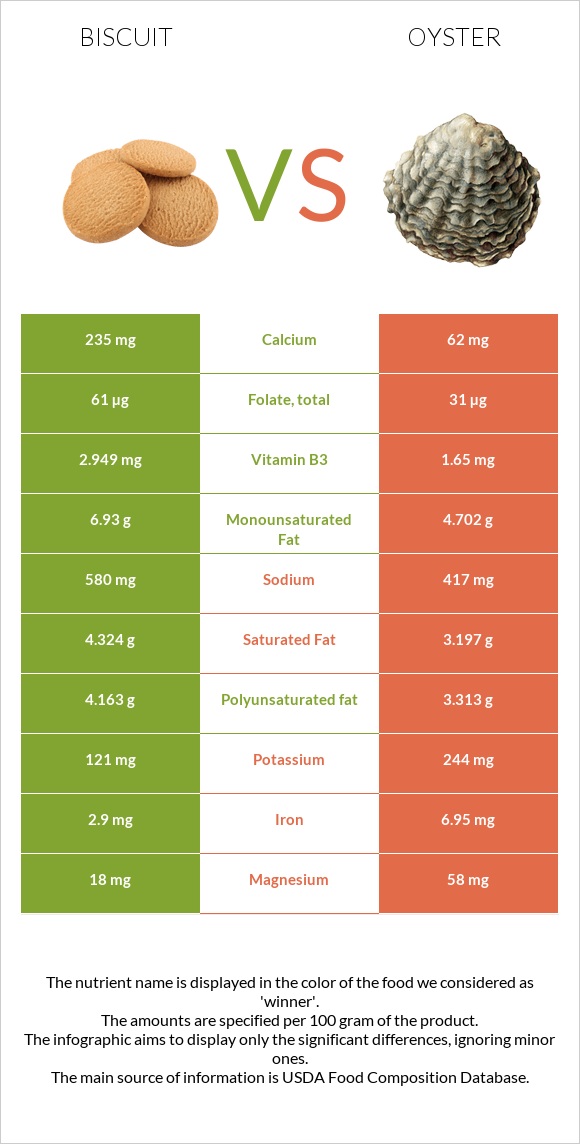Biscuit vs. Oysters — In-Depth Nutrition Comparison
Compare
A recap on the differences between biscuits and oysters
- Biscuits are higher in vitamin B1 and calcium, yet oysters is higher in vitamin B12, zinc, copper, iron, and selenium.
- Oysters covers your daily vitamin B12 needs 726% more than biscuits.
- Biscuits contain 10 times more vitamin B1 than oysters. While biscuits contain 0.356mg of vitamin B1, oysters contains only 0.036mg.
- The amount of saturated fat in oysters is lower.
- The glycemic index of oysters is lower.
Food varieties used in this article are Biscuits, plain or buttermilk, prepared from recipe and Mollusks, oyster, eastern, wild, cooked, moist heat.
Infographic

Infographic link
Mineral Comparison
Mineral comparison score is based on the number of minerals by which one or the other food is richer. The "coverage" charts below show how much of the daily needs can be covered by 300 grams of the food.
| Contains more CalciumCalcium | +102.6% |
| Contains more MagnesiumMagnesium | +94.4% |
| Contains more PotassiumPotassium | +14.9% |
| Contains more IronIron | +217.6% |
| Contains more CopperCopper | +6859.8% |
| Contains more ZincZinc | +14455.6% |
| Contains more PhosphorusPhosphorus | +18.3% |
| Contains less SodiumSodium | -71.4% |
| Contains more ManganeseManganese | +56.3% |
| Contains more SeleniumSelenium | +102.6% |
Vitamin Comparison
Vitamin comparison score is based on the number of vitamins by which one or the other food is richer. The "coverage" charts below show how much of the daily needs can be covered by 300 grams of the food.
| Contains more Vitamin CVitamin C | +∞% |
| Contains more Vitamin B1Vitamin B1 | +888.9% |
| Contains more Vitamin B2Vitamin B2 | +72.2% |
| Contains more Vitamin B3Vitamin B3 | +59.4% |
| Contains more FolateFolate | +335.7% |
| Contains more Vitamin B5Vitamin B5 | +56.8% |
| Contains more Vitamin B6Vitamin B6 | +74.3% |
| Contains more Vitamin B12Vitamin B12 | +21775% |
All nutrients comparison - raw data values
| Nutrient |  |
 |
DV% diff. |
| Vitamin B12 | 0.08µg | 17.5µg | 726% |
| Zinc | 0.54mg | 78.6mg | 710% |
| Copper | 0.082mg | 5.707mg | 625% |
| Iron | 2.9mg | 9.21mg | 79% |
| Selenium | 19.5µg | 39.5µg | 36% |
| Vitamin B1 | 0.356mg | 0.036mg | 27% |
| Cholesterol | 3mg | 79mg | 25% |
| Choline | 130mg | 24% | |
| Polyunsaturated fat | 4.163g | 1.056g | 21% |
| Fats | 16.3g | 3.42g | 20% |
| Sodium | 580mg | 166mg | 18% |
| Monounsaturated fat | 6.93g | 0.506g | 16% |
| Saturated fat | 4.324g | 0.948g | 15% |
| Calories | 353kcal | 102kcal | 13% |
| Carbs | 44.6g | 5.45g | 13% |
| Folate | 61µg | 14µg | 12% |
| Calcium | 235mg | 116mg | 12% |
| Vitamin E | 1.7mg | 11% | |
| Vitamin B2 | 0.31mg | 0.18mg | 10% |
| Manganese | 0.378mg | 0.591mg | 9% |
| Protein | 7g | 11.42g | 9% |
| Vitamin B3 | 2.949mg | 1.85mg | 7% |
| Fiber | 1.5g | 0g | 6% |
| Phosphorus | 164mg | 194mg | 4% |
| Magnesium | 18mg | 35mg | 4% |
| Vitamin A | 26µg | 3% | |
| Vitamin B5 | 0.285mg | 0.447mg | 3% |
| Vitamin K | 2µg | 2% | |
| Vitamin B6 | 0.035mg | 0.061mg | 2% |
| Potassium | 121mg | 139mg | 1% |
| Vitamin C | 0.2mg | 0mg | 0% |
| Net carbs | 43.1g | 5.45g | N/A |
| Vitamin D | 2IU | 0% | |
| Sugar | 2.18g | 1.23g | N/A |
| Starch | 0.9g | 0% | |
| Trans fat | 0.068g | N/A | |
| Tryptophan | 0.087mg | 0.138mg | 0% |
| Threonine | 0.211mg | 0.046mg | 0% |
| Isoleucine | 0.273mg | 0.459mg | 0% |
| Leucine | 0.514mg | 0.716mg | 0% |
| Lysine | 0.226mg | 0.762mg | 0% |
| Methionine | 0.132mg | 0.257mg | 0% |
| Phenylalanine | 0.347mg | 0.413mg | 0% |
| Valine | 0.313mg | 0.523mg | 0% |
| Histidine | 0.161mg | 0.22mg | 0% |
| Omega-3 - EPA | 0g | 0.353g | N/A |
| Omega-3 - DHA | 0g | 0.271g | N/A |
| Omega-3 - ALA | 0.163g | N/A | |
| Omega-3 - DPA | 0g | 0.02g | N/A |
| Omega-3 - Eicosatrienoic acid | 0.004g | N/A | |
| Omega-6 - Gamma-linoleic acid | 0.004g | N/A | |
| Omega-6 - Dihomo-gamma-linoleic acid | 0.007g | N/A | |
| Omega-6 - Eicosadienoic acid | 0.007g | N/A | |
| Omega-6 - Linoleic acid | 0.061g | N/A |
Macronutrient Comparison
Macronutrient breakdown side-by-side comparison
| Contains more FatsFats | +376.6% |
| Contains more CarbsCarbs | +718.3% |
| Contains more OtherOther | +110.5% |
| Contains more ProteinProtein | +63.1% |
| Contains more WaterWater | +170.6% |
Fat Type Comparison
Fat type breakdown side-by-side comparison
| Contains more Mono. FatMonounsaturated fat | +1269.6% |
| Contains more Poly. FatPolyunsaturated fat | +294.2% |
| Contains less Sat. FatSaturated fat | -78.1% |





